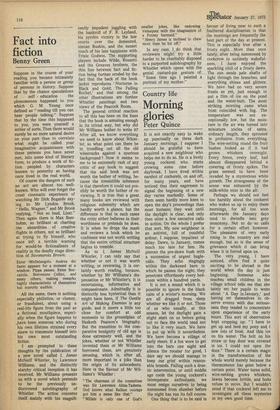Fact into fiction
Benny Green
Suppose in the course of your reading you became intimately familiar with a person or group of persons in history. Suppose that by the chance speculations of self education the phenomenon happened to you which G. M. Young once defined as "reading till you can hear people talking." Suppose that by the time this happened to you, you were yourself a writer of sorts. Then there would surely be no more natural desire on your part than to correlate what might be called your imaginative acquaintance with these persons you have never met, into some kind of literary form, to produce a work of fiction peopled by characters known to posterity as having once lived in the real world.
Of course the dangers of such an act are almost too wellknown. Who will ever forget the cruel cinematic experience of watching Mr Dirk Bogarde saying to Mr Lyndon Brook, "Hello, Wagner," and Mr Brook replying, "Not so loud, Liszt."
Then again there is Max Beerbohm, so brilliant at charting the absurdities of creative flights in others, not so brilliant at trying to fly himself, who once left a terrible warning for would-be flctionalisers of reality in the deadly stage direction of Savonarola Brown:
Enter *Michelangelo. Andrea del Sarto appears for a moment at a window. Pippa passes. Enter Boccaccio, Benvenuto Ceffini, and many others, making remarks highly characteristic of themselves but scarcely audible.
All the same, there is nothing especially philistine, or clumsy, or fraudulent, about using a real-life figure from the past as a fictional mouthpiece, especially when the figure happens to shave been someone who during his own lifetime strained every sinew to transmute himself into his own most outstanding fiction.
I am prompted to these thoughts by the publication of a new novel called I, James McNeill Whistler, by Lawrence Williams, and the distinctly starchy critical reception it has received. Mr Williams presents us with a novel which pretends to be the previously undiscovered autobiography of Whistler. The action concerns itself mainly with his magnifi cently impudent juggling with the bankroll of F. R. Leyland, his pyrrhic victory in the law courts over the demented, simian Ruskin, and the sunset touch of his late happiness with Trixie Godwin. The supporting players include Wilde, Rossetti and the Greaves brothers, the thin line between fact and fiction being further eroded by the fact that the back of the book jacket reproduces Nocturne in Black and Gold; The Falling Rocket,' and that among the other illustrations are further Whistler paintings and two views of the Peacock Room.
The general critical reaction to all this has been on the lines that the book is amusing enough in its trivial way, but why did Mr Williams bother to write it? After all, we know everything we need to know about Whistler, so what point can there be in trundling out all the old wisecracks against a spurious background ? Now it seems to me to be extremely rash of any critic of any book to suggest that the said book was not worth the bother of writing, because the irresistible inference is that therefore it could not possibly be worth the bother of reviewing. It is true that a great many books are reviewed with religious solemnity which are hardly worth a glance, but the difference is that in such cases the critic either believes in their worthiness or pretends he does. It is when he drops the mask and reviews a book which he confesses was not worth writing that the entire critical structure begins to tremble.
As to I, James McNeill Whistler, I can only say that whether or not it was worth writing, or reviewing, it is cer tainly worth reading, because, whether by Mr Williams's dis pensation or Mr Whistler's, it is entertaining, informative and compassionate. Admittedly it is distinctly less hysterical than it might have been, if The Gentle Art of Making Enemies is any guide, and it steers a little too close for comfort at odd moments to the groundplan of Hesketh Pearson's biography.
But the transition to the comparative benignity of old age is done extremely well, and the jokes, whether or not Whistler invented them or Mr Williams borrowed them, are genuinely amusing, which is, after all, more important in a joke than the origin of its antecedents. Here is the flavour of Mr Williams's Whistler : "The chairman of the committee was Sir Lawrence Alma-Tadema. God knows what Balkan outrage got him a name like that." "Millais is only one of God's
smaller jokes, like endowing Velasquez with the imagination of a Putney barmaid."
"Henry James is inclined to chew more than he bit off."
In any case, I do think that reviewers might try a little harder to be charitably disposed to a purported autobiography by Whistler which opens with the genial custard-pie gesture of: "Some time ago I painted a portrait of my mother."


































 Previous page
Previous page